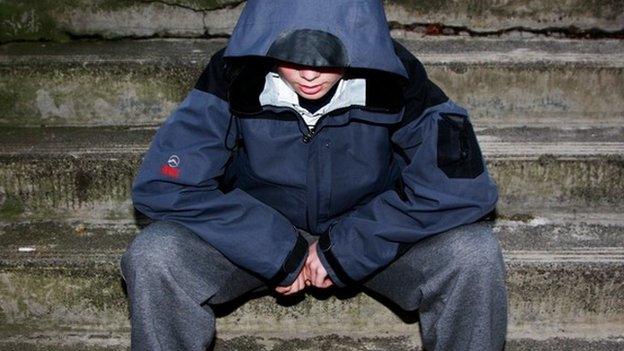English children 'less happy than those in developing countries'
- Published
- comments

English children are less happy and satisfied than youngsters in developing countries, a new survey has revealed.
The Children's Society's Good Childhood Report ranked England behind nations like Romania, Brazil and South Africa.
It came ninth of 11 countries polled - before South Korea and Uganda - on how happy children were with their lives.
The report, based on a survey of 16,000 children from the countries, warned low wellbeing could impair children's health, education and family life.
Further data referenced in the research also suggested that across the whole of the UK half a million children had low levels of wellbeing.
Children's Society chief executive Matthew Reed said while childhood was a happy time for the "vast majority" across the UK, the fact so many were unhappy or dissatisfied with their lives could not be ignored.
"This new report lifts the lid on the fact that we're lagging behind so many other countries, including developing nations," Mr Reed said.
"This research can't be dismissed as being about 'grumpy kids'. Children with low wellbeing are more likely to experience serious issues, such as poor outcomes related to school, family and their health."
According to the figures in which England was compared with 10 other countries, one in eight English children was unhappy with their appearance. Only youngsters in South Korea were more unhappy in this area.
'Listen closely'
Children in England tended to be somewhat more positive in their attitudes about friends, home, and money and possessions, ranking sixth out of the 11 countries.
The report found a link between a child's wellbeing and their financial situation.
Around a third of children said their families had been impacted a "fair amount" or a "great deal" by the economic crisis.
These children were more likely to have low wellbeing, according to the report.
It said children who saw themselves as poorer were twice as likely to say they were unhappy and almost three times more likely to say they had low life satisfaction.
"Children are telling us that they're unhappy about their future and how they look, as well as the things that make them happier like being active, having strong friendships and going online," Mr Reed added.
"It's crucial that all of us - from policy-makers to parents and teachers - listen very closely to what they have to say."
The 11 countries ranked in the report are England, Romania, Spain, Israel, Brazil, USA, Algeria, South Africa, Chile, South Korea and Uganda.
Around 16,000 children were surveyed - 3,000 of which were from England and from school years four, six and eight.
- Published24 April 2014
- Published22 July 2013